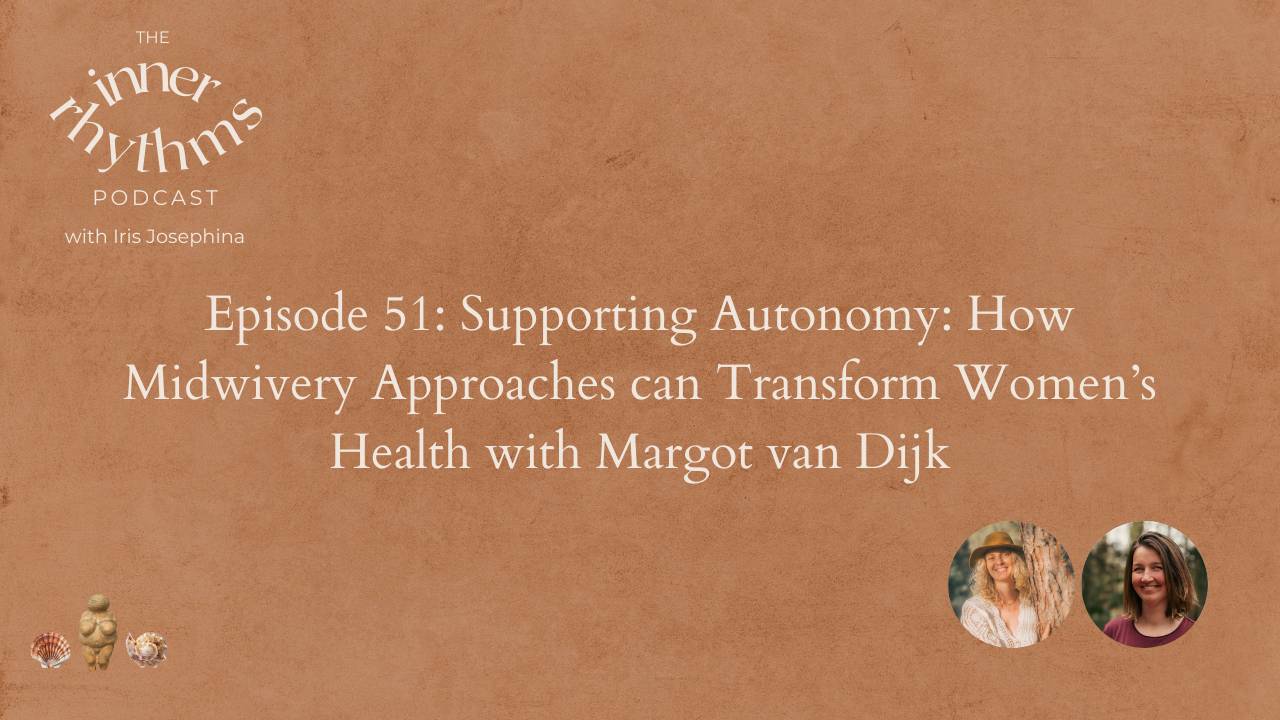Episode 51: Supporting Autonomy: How Midwifery Approaches can Transform Women’s Health with Margot van Dijk

I had the pleasure of speaking with Margot van Dijk, a midwife with over 10 years of experience who brings a refreshing perspective to pregnancy, birth, and women's health. Margot shares her journey from being a young midwife at 22 to now being both a midwife and a mother, adding new dimensions to her practice and understanding.
What makes Margot's approach unique is her commitment to nuance in a field that often becomes polarized between the "medical technology birth world" and the "supernatural birth world." Through her platform "Vraag de Verloskundige" (Ask the Midwife), she provides in-depth information for both pregnant people and birth workers that goes beyond rigid guidelines, offering a spectrum of evidence-based options.
Topics Covered
In this grounding conversation with Margot van Dijk, we explore:
- The evolution of her midwifery practice over 10 years
- The transition from "medical midwife" to "wise woman" midwife
- What autonomy means in the context of birth and how it relates to positive experiences
- How her own birth experience confirmed her beliefs about empowered birthing
- The importance of relationship-based care in the caseload midwifery model
- How midwifery could expand to encompass broader women's health concerns
- Practical advice for pregnant people and birth workers
- The Dutch midwifery system compared to other countries
About Margot van Dijk
Margot van Dijk is a midwife with over 10 years of experience, practicing as a caseload midwife in the Netherlands. She is also the founder of "Vraag de Verloskundige" (Ask the Midwife), a platform providing in-depth information for both pregnant people and birth workers that goes beyond standard guidelines to offer a spectrum of evidence-based options.
As a recent mother herself to daughter River, Margot brings both professional expertise and personal experience to her work, creating a unique perspective that honors both clinical knowledge and intuitive wisdom.
Connect with Margot:
- Website: www.vraagdevroedvrouw.nl
- Instagram: https://www.instagram.com/vroedvrouwmargot/ & https://www.instagram.com/vraagdevroedvrouw/
Listen to the Episode
Timestamps
[00:00:00] Introduction and advertisement for hormone coaching certification
[00:01:11] Introduction to Margot and overview of the episode
[00:06:16] Margot's 10-year journey as a midwife
[00:09:07] Discussion of Margot's platform for nuanced information
[00:12:15] What being a midwife means to Margot now
[00:14:38] How becoming a mother confirmed Margot's beliefs about birth
[00:15:57] The concept of autonomy in birth experiences
[00:17:02] How autonomy affected Margot's own birth experience
[00:19:16] The importance of flexibility during birth
[00:21:18] The role of intuition and bodily awareness in birth
[00:23:42] How midwifery approaches could benefit women's health beyond pregnancy
[00:26:31] The caseload midwifery model explained
[00:31:16] The emotional and mental load of being a midwife
[00:35:00] Discussion of the Netherlands' supportive midwifery system
[00:36:06] Margot's advice for pregnant people and birth workers
[00:39:03] The value of focusing on individual positive experiences rather than fighting the system
[00:41:05] Where to find Margot online
From Medical Midwife to Wise Woman
Margot reflects on her transformation over the past decade of practicing midwifery:
"I think I transformed over the past 10 years from the medical midwife with only knowledge on the medical scope of practice to a wise woman midwife where I feel I am more a guide to women and their partners. What really changed is that I realized I do not know any better than them. Because even though I studied and I've witnessed 500 births or something like that, I never know how it is to be the other person."
This shift represents a profound change in perspective—moving from a position of authority to one of partnership and guidance. Rather than imposing her knowledge, Margot now sees her role as providing information and support that empowers parents to make their own decisions.
The Caseload Midwifery Model
Margot practices as a caseload midwife, a model that differs significantly from the standard midwifery care in the Netherlands:
"As a caseload midwife, my caseload is two to four women a month and I take care of my clients throughout the whole cycle of pregnancy, birth, postpartum. It's much more intensive than the regular midwifery care in the Netherlands, where it's 10 to 15 minutes per checkup. With me, it's more an in-depth consultation, often one and a half hours each time."
This approach allows her to build deeper relationships with her clients, which she considers the foundation of trust for working together. The continuity of care means clients see the same midwife throughout their journey, rather than potentially meeting their birth attendant for the first time during labor.
In contrast, midwives in standard practices might attend multiple births in a 24-hour shift, sometimes moving between birthing rooms or locations as needed.
Autonomy in Birth
A central theme in Margot's practice is autonomy—the ability of birthing people to make their own informed choices:
"Autonomy is that you decide what happens to you. You decide, you say yes or no to anything that happens during the birth. Sometimes in making decisions, you will need knowledge or information from your care provider or maybe from other people who join your birth. It's not 'I know everything better and I don't want any help.' That's not the same."
Margot emphasizes that autonomy doesn't mean refusing all guidance or assistance. Rather, it means gathering information, understanding options, and then making decisions that feel right for your unique situation.
She shares her own birth experience as an example. Despite planning a home birth, she ended up requesting an epidural in the hospital:
"It was a great experience and I felt so saved and so loved and so seen. It was such an amazing experience. And then I was confirmed again, this is how it should be. It should not matter if you need medical help or not—it should be a great experience above all."
This experience confirmed her belief that birth location and interventions matter less than feeling respected, heard, and empowered throughout the process.
The Importance of Flexibility in Birth
One of the most valuable insights Margot shares is the need for both preparation and flexibility:
"You need to know what you want. I always say you have to create your favorite scenario for birth. Because if you don't know what you want, you're never gonna get it. But you also need to prepare for what if I want medical help or what if there's a complication."
She notes that this flexibility is supported by knowledge. When you understand your options, you can adapt more easily if your birth takes an unexpected turn. However, she also emphasizes the importance of being in tune with your body:
"What I needed is being in tune with myself, listen to myself and really feel what is going on in my body and feeling what my body needs. We're sometimes maybe too stuck in planning, but the other part is also really important—to learn to listen to yourself and take yourself seriously."
Midwifery Beyond Pregnancy and Birth
When asked about expanding midwifery to encompass broader women's health concerns, Margot expresses enthusiasm:
"I think it is undeniably all one. I wish also that midwifery would be women's health, not only pregnancy, birth, postpartum. I think it would be great if we start so much earlier with girls and boys, with children or teenagers, to inform them on their bodies, somatic experiences, how it works, and how fertility works."
She notes that in the Netherlands, many midwives already provide contraception services including IUD placement, but there's "a big world" to explore in areas like miscarriage and abortion care.
This vision aligns with a more holistic approach to reproductive health—one where midwives serve as bridges between general practitioners and specialists, providing continuity of care across a person's reproductive lifespan.
The Responsibility of Midwifery
Margot offers a powerful perspective on the weight of responsibility that comes with midwifery:
"We work with life and death. We work on the border, or I sometimes say we work through the same gate where life goes and where death goes. The responsibility that comes with that—I'm not responsible for the outcome because I can't decide on life or death, luckily, but the feeling of it, that you work with life and death, can sometimes be very intense."
This responsibility becomes particularly complex when navigating situations that fall outside standard guidelines or when clients want approaches that differ from what the midwife believes is best. These tensions require emotional and ethical flexibility alongside clinical judgment.
Advice for Pregnant People and Birth Workers
Margot offers valuable advice for those preparing for birth and those supporting them:
For pregnant people:
"Number one is for sure, do not forget your postpartum time. Make your postpartum time priority number one, I think above birth. Really dive into what it means to be postpartum and learn about breastfeeding, baby sleep, how to feed and nourish yourself, and have a team of people around you."
She also emphasizes the importance of choosing the right birth team:
"If you have a midwife or care provider and it does not feel okay, just don't do it. Search for somebody else, even if you're 41 weeks. Your birth team is going to play a big role in how safe and respected and seen you will feel."
For birth workers:
"Before, I would have this idea that maybe we can change the system together. Now I'm more at 'I don't think we can change the system,' or maybe in a very long-term way. But if every day you wake up with the idea 'I have to change the system,' that's a heavy burden."
Instead, she recommends focusing on "one woman, one baby, one couple of parents at a time," creating space for them to discover their autonomy and process. She also advises having a supportive community of fellow birth workers "that you really feel you can cry and laugh with, recharge with" while still dreaming big together.
Key Takeaways
- Autonomy is fundamental - Birth experiences are most positive when people feel heard, respected, and in control of decisions affecting their bodies
- Knowledge creates flexibility - Understanding your options and the birth system helps you adapt when things don't go as planned
- Relationship-based care matters - The caseload midwifery model creates deeper connections and more personalized support
- Postpartum deserves priority - Preparation for the postpartum period is as important as birth preparation
- Choose your birth team carefully - The people supporting you significantly impact how safe and respected you'll feel
- Small changes create big impact - Birth workers can focus on individual positive experiences rather than fighting entire systems
- Body awareness is essential - Learning to listen to your body's needs complements intellectual preparation
- Midwifery could expand - The midwifery model has potential to address broader women's health concerns throughout life
About the Host
I’m Iris Josephina—functional hormone specialist, orthomolecular hormone coach, and entrepreneur. Through Cycle Seeds and The Inner Rhythms Podcast, I support people in reconnecting with their cyclical nature, deepening body literacy, and reclaiming hormonal harmony from a place of sovereignty and embodied knowledge. Most people know me from Instagram, where I share stories, tools, and inspiration on cyclical living, menstrual cycles, fertility, hormones and more.
Let’s stay connected:
💻 Visit the Cycle Seeds website



